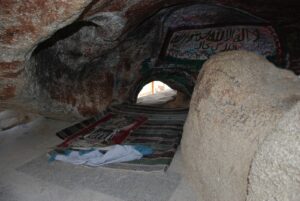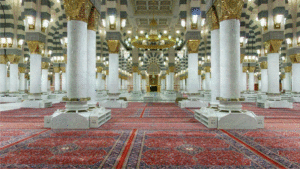Hadhrat Hasan Basri (Rahmatullahalayh) : The Paradigm of Piety and Eloquence – Part 3
![]()
30. Tawaadhu’ (humility) was an outstanding attribute of Hadhrat Hasan. He considered himself inferior to everyone else. One day while walking along the bank of the river Dajlah he saw a Habshi (Abyssinian) with a woman and a wine-bottle. A thought crossed his mind: ‘This man cannot be better than me because he is with a woman and consuming wine.’ As the thought crossed his mind a boat with seven occupants appeared on the river. Suddenly the boat began sinking. Seeing the plight of the boat-people the Habshi dived into the water and safely brought out one person. He returned and brought out a second man. He continued his rescue until he had saved six people. Turning to Hadhrat Hasan, the Habshi said: “If you are better than me, then save the seventh one. O Imaam of the Muslims! This woman is my mother. The bottle contains water. I am here to test you. I have seen that you have failed the test.”
Hadhrat Hasan now realised that the Habshi was a close servant of Allah appointed to test him (Hasan). He fell at the Habshi’s feet imploring: “Just as you have saved the six persons from drowning in the sea, save me from the sea of egotism and deception.”
The Habshi: “May Allah brighten your eyes (i.e. spiritual eyes).” Never again did Hadhrat Hasan regard himself better than any person. His state of humility reached such a pinnacle that once seeing a dog he supplicated: “O Allah! Accept me by virtue of this dog.”
31. Once on seeing an intoxicated man swaying from side to side while walking in a muddy path, Hadhrat Hasan counselled: “Walk carefully otherwise you will slip.” The man responded: “O Imaam of the Muslims! You walk carefully. If I slip, I alone fall. If you slip, the whole Ummah falls (i.e. strays from the Path of Truth).” This response made an indelible impression on the heart of Hasan Basri.
32. A lad was walking with a flame in his hand. Hadhrat Hasan Basri said to him: “From where did you get the flame?” The lad extinguished the flame and said: “Where has the flame gone?”
33. Once Hadhrat Hasan Basri said to his disciples: “If you should see the Sahaabah you would say that they are mad men and if they should see you, they would not consider you to be Muslims. They were horsemen flying like birds as swift as the wind while we are like those seated on the wounded backs of asses.”
34. A Bedouin asked Hadhrat Hasan the meaning of sabr (patience). Hadhrat Hasan said: “Sabr is of two kinds.
One: Sabr when calamity and misfortune strike.
Two: Sabr regarding the prohibitions of Allah Ta’ala (i.e. restrain oneself from indulgence in the things prohibited by Allah Ta’ala).”
35. “A man should strive to acquire beneficial knowledge and excellent deeds accompanied by sincerity, contentment and beautiful patience. I cannot explain the lofty status which a man of this acquisition will gain on the day of Qiyaamah.”
36. “A sheep is more alert than man. On hearing the call of the shepherd it stops grazing while man ignores the call of Allah for the sake of his desires.”
37. “Ma’rifat (i.e. a high perception of divine recognition) is abandonment of lowly desires.”
38. “Jannat cannot be attained merely by good deeds. Good intentions are essential.”
39. “Fikr (contemplation) is a mirror in which good and bad are visible.”
40. “Futile talk is evil. Silence devoid of fikr is futility and disgraceful.”
41. “Wara’ (piety) has three stages: To speak the truth even in anger; abstention from the prohibitions of Allah Ta’ala; constancy in the execution of Allah’s commands.”
42. “A little piety is better than a thousand years of (Nafl) Saum and Salaat.”
43. “Contemplation (fikr) and wara’ (piety) are the noblest deeds.”
44. “Nifaaq (hypocrisy) is the contradiction between the baatin (the heart / intentions) and the zaahir (verbal proclamation).”
45. “All true Mu’mins who have passed away had the fear of having nifaaq in them.”
46. “The compensation for gheebat (speaking ill of people in their absence) is istighfaar (i.e. to seek forgiveness from Allah Ta’ala).”
(If the person is aware of the gheebat, it will also be necessary to seek forgiveness from him.)
47. “Man will have to give a reckoning for the halaal and haraam of this world in which he had participated.”
48. “Every person (i.e. with love of the world in his heart) will depart from this world with three regrets:
(1) His desire for accumulation of wealth will be unfulfilled.
(2) Unrealized goals.
(3) Having made no preparations for the journey of the Hereafter.”
Scattered Pearls
-18-
49. Someone reported to Hasan Basri that a certain man was in his death throes. He commented: “He was in his death throes since his appearance on earth. He will now be released.”
50. “He who has no love of the world will be saved. The one entrapped in the world is ruined. Those who are not proud of the bounties of the world will be forgiven.”
51. “An intelligent man abandons the world and develops the Aakhirah.”
52. “In this world there is no animal more rebellious than the nafs.”
53. “Allah disgraces a man who honours (loves) gold and silver.”
54. “A man who regards himself as a leader of the community is astray.”
55. “A man who narrates the defects of others to you, will most assuredly narrate your defects to others.”
56. Once when Hasan Basri saw a man eating in the qabrustaan (cemetery), he said: “This man is a munaafiq (hypocrite). A man whose desires agitate in the presence of the dead has no belief in Maut and the Aakhirah. Whoever does not believe in Maut and the Aakhirah is a munaafiq.”
57. On the night that Hadhrat Hasan Basri (rahmatullah alayh) died, a buzrug saw in a dream the portals of the heaven opening and a voice proclaimed: “Hasan Basri has reached Allah Ta’ala.”



